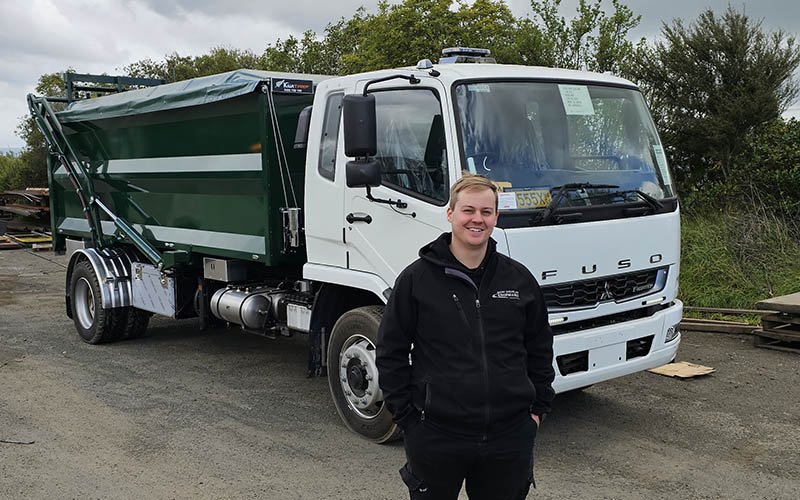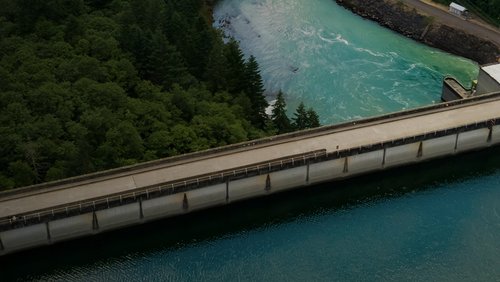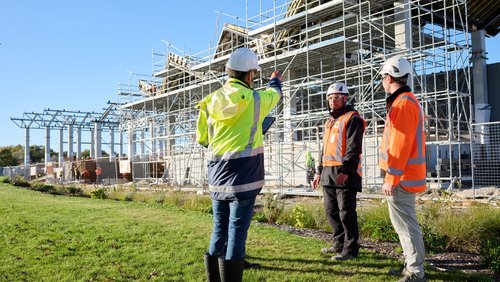22 Oct 2024
The Heavy vehicle engineering career pathway recently received a boost with the launch of an award-winning training programme. Explore the industry further with Alan Kirk, a heavy vehicle engineer.
In 2021, Alan graduated from University of Canterbury with a Bachelor of Engineering with Honours in Mechanical Engineering. In his last year, he took electives specialising in finite element analysis, failure analysis and design.
He was attracted to the heavy vehicle certification industry while completing his practical work experience at Gary Douglas Engineers (GDE).
Alan says, “During this period I worked in the repair shop, helping service various trucks and trailers, including a major overhaul of a house moving trailer! I must admit, I didn’t have a lot of insight into the industry at that point beyond knowing that freight is predominantly moved by trucks. This experience was an eye-opener for me as I had no idea so much manufacturing occurred in New Zealand.”
What followed was the offer of an internship at GDE, before landing full-time employment there.

Alan Kirk. Image: Supplied
“I learnt about several features during this time, from the basics of what holds trucks and trailers together on the road, to helping design a brand new 4-axle semi-trailer for a local client, or a ‘pup-deck’ so that a client could cart a car (Smart Fortwo) behind the cab of his tractor unit. I was immediately drawn to the industry’s knack for getting stuck in, and getting things done. Everything was a fast-paced experience”, says Alan.
Thinking about his own experience joining the industry, Alan believes the new heavy vehicle training programme containing a fundamental skillset is incredibly beneficial. With topics like Mechanical Fasteners and General Mechanical Analysis, and certification programmes for towing connections and load anchorages.
The training was the output of the Heavy Vehicle Training Design and Development Project, recently awarded the Fulton-Downer Gold Medal, one of the highest accolades presented by the President of Engineering New Zealand. A group of engineering certifiers joined forces with Engineering New Zealand and the regulator, NZ Transport Agency Waka Kotahi (NZTA), to create a training programme based on recommended practice to achieve consistent certification compliance.
The new training programme has shaped up very well and I believe it will help future trainees.
With so few certifiers relative to the number of heavy vehicles in New Zealand, Alan believes the training has the potential to stabilise the industry and improve outcomes for all, from engineers to fabricators and operators.
Alan recently took the opportunity to help facilitate some of the training. He believes it’s important to support newcomers to the heavy vehicle specialist certifier industry.
Alan’s employer has paid for a lot of his training. “I couldn’t sum it up myself, but I’m sure they’d love to tell me how much I’m worth. I’ve travelled all over the country, from Christchurch to Auckland and just about everywhere in between. Training is a mandatory part of the job, just as it is all over the engineering field.”
“I was also recently sponsored by the Industry for Road Transport Engineers NZ (IRTENZ) to visit the University of Michigan’s Transport Research Institute to attend a course on heavy vehicle dynamics.”
You must be a problem solver. Every day brings a new challenge.
He also appreciates that, in addition to working with Engineering New Zealand and the industry to bring the training programme to fruition, NZTA has improved the induction process for new engineers further by eliminating exam fees.
When asked what attributes he believes are important for this industry, problem solving is top of mind.
“You must be a problem solver. Every day brings a new challenge. They aren’t all difficult, and certainly become easier to deal with over time, but they do exist. You also need to think on your feet in the industry as there are very few problems which are ever the same.
You must be resilient and willing to step outside of your comfort zone. There is a large element of people skills involved. You meet someone new almost every day. The ability to pick up the phone, and remember faces and names goes a long way, and perhaps even further than workbook-based skills.”
Alan’s inspired by the continual change within the heavy vehicle industry and the new challenges this brings as a heavy vehicle specialist certifier. Once upon a time, a truck with 300 horsepower (hp) and combination mass of 40 tonne (T) was incredible. Nowadays, many trucks push near 800hp and 60T in combination, leading to a slew of changes.
“I’m continuously learning which keeps me engaged – every new build that goes out is a moment of pride for me. In the last couple of months, I have helped get a truck with an over 100 tonne-metres mobile crane on the road. Getting that to comply within NZ’s legal framework & the engineering challenge itself was very rewarding.
I recently got to apply my skills in Computational Fluid Dynamics (CFD) to an innovation. We’ve launched a novel product to market – a traffic management truck with a roof (these typically have open-air flat decks). I used my experience in CFD to predict reductions in drag. This was used to help with a cost-benefit analysis before going ahead with the project.”
Emerging technologies also present heavy vehicle engineers with new challenges and there is a lot of change on the horizon to be part of.
Alan has had some experience in this space already and is excited to see the potential that small hybrid, hydrogen, and electric vehicle trucks bring to the heavy vehicle industry.
It’s an exciting time to be joining the industry and he encourages anyone studying or interested in engineering to consider heavy vehicle specialist certification as their vocation.
You can find out more about the heavy vehicle training programme, including fundamentals that are beneficial across a range of engineering disciplines, on the NZTA vehicle inspection website.




